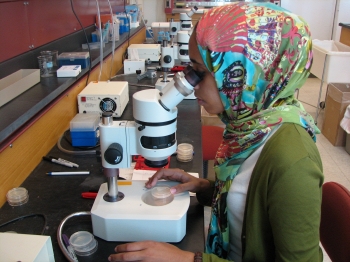COVER STORY SIDEBAR
Research experience is vital for Qatar pre-meds
At Weill Cornell Medical College in Qatar (WCMC-Q), students in the two-year premedical program have daunting amounts of information to absorb in an ultra-condensed curriculum. But even so, exposing the students to research has been a goal since the beginning, says David Robertshaw, professor of biomedical sciences emeritus and former WCMC-Q associate dean.

Sara Buhmaid, now a first-year medical student at Weill Cornell Medical College in Qatar, was one of 12 WCMC-Q students to spend the summer of 2008 doing research on Cornell's Ithaca campus. Buhmaid's work involved mapping a gene in the worm C. elegans. "It's been very positive," she said of the experience. "I definitely have research in my future." See larger image
Robertshaw established a program in 2003 that brings second-year WCMC-Q premedical students to Ithaca every summer for research in labs across campus.
The program was designed to introduce the pre-meds to the spirit of inquiry, according to Robertshaw: to allow them to explore their own interests instead of simply being fed information, and to gain an appreciation for the collaborative nature of scientific research.
"That's an important point -- collaboration -- because that's what research these days is all about," Robertshaw says. The program, which links the Qatar students with Cornell undergraduates doing research in the biological sciences supported by the Howard Hughes Medical Institute, has gotten rave reviews from students and faculty alike.
The laboratory is also a perfect setting for cross-cultural diplomacy, Robertshaw adds, with students from Qatar, the United States and dozens of other countries and backgrounds working together toward a common research goal.
Sara Buhmaid, a first-year medical student at WCMC-Q, was one of 12 doing research in Ithaca last summer in the pre-med program. The project, which involved mapping a gene in the worm C. elegans, gave her insight far beyond the staged labs of a chemistry or biology class, she says.
"We studied all the principles [in class], but when you're actually doing the research all the little details become very important," Buhmaid said. "I definitely have research in my future."